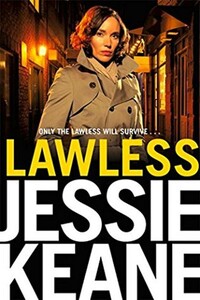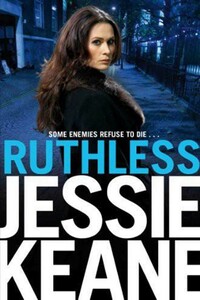Stay Dead - [22]
‘This flu’s a bugger, but you’ll be better soon, don’t worry,’ she said.
Then Dad came in from work that evening and said: ‘It’s all fixed up, we’ll go tomorrow.’
His eyes were doing that slip-sliding thing again, going around the room, not looking at his daughter, and he was sweating. Fix what? wondered Dolly. As soon as he’d gone, her hands wandered to her stomach, feeling the slight alien curve of it. She’d seen pregnant women; she’d be like the side of a house soon, and there would be things to buy, nursery stuff, she supposed. That must be what Dad was talking about. And at least this thing inside her meant that he wouldn’t touch her any more; there was that to be thankful for.
The next day Dad stayed off work. Dolly got up, ate breakfast, spewed it back up, then cleaned herself and they caught the bus over to Aldgate. Maybe there was a shop there with kids’ stuff, she didn’t know and she didn’t ask. Dad didn’t talk to her on the journey and Dolly was glad of that. She felt both queasy and numb, all at the same time. The numbness, the distance from the real world, had started the first time he’d played the man-and-woman game with her, and it had stayed.
When they got off the bus, they walked a couple of streets along lines of identical Victorian semis. Dad opened the gate of one called ‘Swanlea’ and Dolly trailed after him up the little chequer-tiled path, feeling almost faint. Dad knocked on the door and in a minute or so it was opened by a middle-aged woman so heavily made up it looked like she was wearing a clown’s mask. Her eyes were huge and fringed with blackened lashes. Her darkly tinted red hair, all the life coloured out of it so that it had the texture of a Brillo pad, stood out around her face like a frazzled scarlet halo.
‘Mrs Averly?’ asked Dad.
‘Yeah. Mr Farrell, is it?’ she said, fag in hand. She squinted first at him and then at Dolly. ‘Come in then.’
They moved into a grubby hallway that stank of cabbage and cat piss, and the woman shut the door behind them.
‘First things first,’ she said, and held out her hand.
Dad rummaged in his billfold and pulled out a fiver. He placed it in her hand, and she nodded with satisfaction and quickly tucked it into her bra.
‘That’s fine. You can wait down here.’ She turned to Dolly. ‘Come on then, girl, up the stairs.’
This wasn’t a shop with baby clothes. Bewildered, Dolly followed the woman up. They went into a tiny box room; inside there was a fold-up bed stashed against the wall, hectic violet wallpaper with sprigs of heather rampaging all over it. In the centre of the room, on the scuffed and worn purple carpet, was a yellow washing-up bowl steaming with warm water and frothy with soap suds. Beside it was what Dolly recognized as an enema, and an open packet of Omo.
‘We’ll soon have you straight again,’ said the woman, crossing to the fold-up bed and stubbing her cigarette out on an overflowing ashtray perched there. ‘Don’t you worry.’
Dolly had no idea what she meant, but she was a kid and this ugly gorgon of a woman was an adult; it wasn’t her place to question.
Then the woman turned back to her with a thin smile. ‘Right then, lovey. Slip your knickers off and stand over the bowl.’
22
Dolly didn’t know how she got back down those bloody stairs and out of that place in Aldgate. She was in agony. From the moment the woman had started pumping that Omo mixture into her, she’d been doubled up with pain.
‘Don’t you worry about that, you’ll come away, that’s what matters,’ said the woman in an irritated tone of voice because Dolly had the gall to complain and start to cry.
Dolly didn’t even know what that meant. Come away? Come away with what?
‘All right then, Doll?’ asked Dad when she came back downstairs, and he looked sheepish when he saw how white she was, her face twisted up with pain, before his gaze skipped away from her again.
‘Thanks,’ he said to the woman, and they left.
Dolly, standing at the bus stop and trying not to pass out, couldn’t believe it. Her dad had taken her to that horrible ugly frightening cow and let her do that dreadful thing to her. As they waited and the rain drizzled down, a young mother with a child in a pushchair stood nearby and the child howled its head off.
Shut up, you little shit, thought Dolly, looking daggers at the tiny thing, feeling she could hardly bear to have that near her, not when she’d had all this done to her.
‘Dad…’ she moaned, clutching at her stomach.
‘Bus’ll be here in a mo,’ he said brightly, smiling at the young woman with the kid, everything normal here, nothing to see.
Eventually the damned bus came, and they all piled on. Dolly didn’t know how she made it the whole length of the journey without shrieking out loud. Finally they were home, and Dad helped her up the stairs to bed and then left her there, closing the door behind him.
‘Dolly’s not well, but she’ll soon feel better,’ she heard him saying to Sarah out on the landing. ‘Don’t go in, Sar, she’s having a kip.
Dolly writhed on the bed in fearful agony all the rest of that day and all night. She couldn’t sleep through the pain, it was awful. When morning came and it got light she tried to get up, to get dressed. She could hear the others, her brothers and her sister, getting up, going downstairs to the kitchen, but she could hardly move, the pain was too great.

Only the lawless will survive…It is 1975 and Ruby Darke is struggling to deal with the brutal murder of her lover, Michael Ward.As her children, Daisy and Kit, battle their own demons, her retail empire starts to crumble.Meanwhile, after the revenge killing of Tito Danieri, Kit is the lowest he's ever been. But soon doubt is thrown over whether Kit killed the right person, and now the Danieris are out for his blood and the blood of the entire Darke family.As the bodies pile up, the chase is on – can the Darkes resolve their own family conflicts and find Michael Ward's true killer before the vengeful Danieris kill them? Or will they take the law into their own hands…Lawless is the heart-racing sequel to Nameless, from bestselling author Jessie Keane.

SHE THOUGHT SHE'D SEEN THE BACK OF THE DELANEYS. HOW WRONG COULD SHE BE…Annie Carter should have demanded to see their bodies lying on a slab in the morgue, but she really believed the Delaney twins were gone from her life for good.Now sinister things are happening around her and Annie Carter is led to one terrifying conclusion: her bitter enemies, the Delaney twins, didn't die all those years ago. They're back and they want her, and her family, dead.This isn't the first time someone has made an attempt on her life,yet she's determined to make it the last.

В книге рассказывается история главного героя, который сталкивается с различными проблемами и препятствиями на протяжении всего своего путешествия. По пути он встречает множество второстепенных персонажей, которые играют важные роли в истории. Благодаря опыту главного героя книга исследует такие темы, как любовь, потеря, надежда и стойкость. По мере того, как главный герой преодолевает свои трудности, он усваивает ценные уроки жизни и растет как личность.

В книге рассказывается история главного героя, который сталкивается с различными проблемами и препятствиями на протяжении всего своего путешествия. По пути он встречает множество второстепенных персонажей, которые играют важные роли в истории. Благодаря опыту главного героя книга исследует такие темы, как любовь, потеря, надежда и стойкость. По мере того, как главный герой преодолевает свои трудности, он усваивает ценные уроки жизни и растет как личность.

В книге рассказывается история главного героя, который сталкивается с различными проблемами и препятствиями на протяжении всего своего путешествия. По пути он встречает множество второстепенных персонажей, которые играют важные роли в истории. Благодаря опыту главного героя книга исследует такие темы, как любовь, потеря, надежда и стойкость. По мере того, как главный герой преодолевает свои трудности, он усваивает ценные уроки жизни и растет как личность.

В книге рассказывается история главного героя, который сталкивается с различными проблемами и препятствиями на протяжении всего своего путешествия. По пути он встречает множество второстепенных персонажей, которые играют важные роли в истории. Благодаря опыту главного героя книга исследует такие темы, как любовь, потеря, надежда и стойкость. По мере того, как главный герой преодолевает свои трудности, он усваивает ценные уроки жизни и растет как личность.

В книге рассказывается история главного героя, который сталкивается с различными проблемами и препятствиями на протяжении всего своего путешествия. По пути он встречает множество второстепенных персонажей, которые играют важные роли в истории. Благодаря опыту главного героя книга исследует такие темы, как любовь, потеря, надежда и стойкость. По мере того, как главный герой преодолевает свои трудности, он усваивает ценные уроки жизни и растет как личность.

В книге рассказывается история главного героя, который сталкивается с различными проблемами и препятствиями на протяжении всего своего путешествия. По пути он встречает множество второстепенных персонажей, которые играют важные роли в истории. Благодаря опыту главного героя книга исследует такие темы, как любовь, потеря, надежда и стойкость. По мере того, как главный герой преодолевает свои трудности, он усваивает ценные уроки жизни и растет как личность.